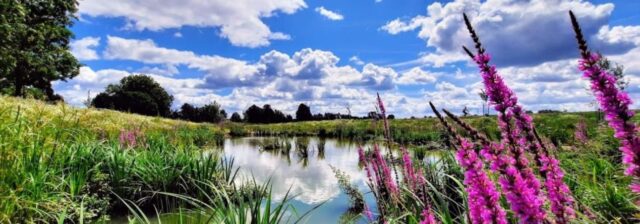Policymakers, water companies, businesses, industry and the public in London will all need to work together help to protect London’s rivers in order for them to be better prepared to tackle the impacts of droughts and floods brought on by the climate crisis, the organisers of London Rivers Week have urged.
Climate resilience is the theme of this year’s London Rivers Week (29th May to 4th June) – an annual event aiming to inspire the public to help protect the capital’s waterways.
The Catchment Partnerships in London (CPiL), which runs London Rivers Week through its London Rivers Restoration Group (LRRG), are calling for the following to tackle take the following actions:
Funders should invest in river restoration projects such as creating wetlands and rain gardens to soak up flood water from rivers or developing wildlife-rich ponds and meadows to provide space to accommodate stormwater to reduce flood risk.
All river stakeholders, including water companies, businesses, regulators, industry and the public must invest in ending all sewage pollution and the management of land and surface water as a system (catchment-based management) to deliver healthy rivers.
The same stakeholders need to work together to prevent plastic pollution entering London’s rivers.
Flood plains in London are currently home to 1.42 million people, as well as £321bn-worth of homes. So, everyone has a part to play to protect lives and livelihoods.
The public can get involved in citizen science projects to monitor the health of their rivers in order to gather evidence on the issues and opportunities for water quality improvements.
The call comes ahead of London Rivers Week, which has a packed programme of walks, talks and online seminars for everyone to get involved in.
Debbie Leach, CEO of environmental charity Thames21 which chairs CPiL, said: “We are excited to see London Rivers Week return for its seventh year. From climate-themed meandering river walks to river cruises and family-fun events, we want to celebrate London’s blue spaces. Our packed programme has a wonderful mix of free events for everyone to enjoy. We really look forward to seeing you there!
“It is fantastic to celebrate London’s rivers and the river restoration work we have done to improve them. Our projects are supporting the restoration of some of the capital’s important waterways, helping them to adapt to a changing climate, as well as create a vital habitat for nature.
“Nevertheless, it is also important that we keep putting pressure on everybody to make sure they keep our rivers healthy in order to respond to the climate emergency. Rivers will be vital instruments if we are to tackle more extreme, accelerated and intense periods of drought and flood and manage their impact on people and wildlife.”
Dave Webb, a biodiversity specialist at the Environment Agency and chair of the London Rivers Restoration Group, said: “Restoring and rewilding London’s rivers is a no-regret action that we can take now to reduce the impact of extreme events and the long-term effect of the climate change. The Environment Agency recently cleared 700 tonnes of harmful floating pennywort from the Duke of Northumberland River near Twickenham. It was depriving water life of oxygen it needed to survive.
“Separately, we are working with government, councils and owners of the vast majority of flood defences upstream of the Thames Barrier to raise them by 2050, 15 years earlier than planned, due to an increased risk from higher sea levels and a warming climate.”
River restoration initiatives can include projects such as adding wood material to a river or removing concrete from its banks. On average, 3km per year of rivers and other waterways have been restored in the capital since 2000, but the LRRG has set an ambitious target to increase that rate to 5km by 2025, which would restore one-third of London’s 640km of waterways by 2050.




